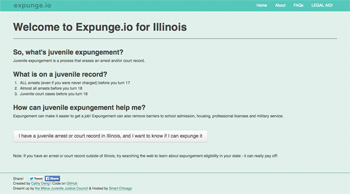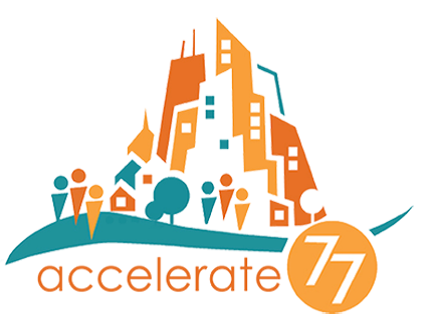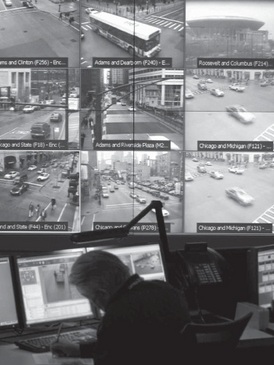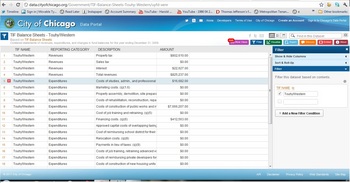On Black Friday of 2014, Kristiana Rae Colón — a local Chicago artist recently turned organizer — planned a day of action to honor Mike Brown and protest Black Friday spending. Police surveillance was not really on Colón's mind when she organized the protest and march; her aim was to call attention to the connection between the criminalization of black people and the American capitalist system. But a police-scanner recording from that day reveals what seems to be evidence that Chicago police are illegally accessing data from protestors' phones. And in the recording, Colón is the target of this likely surveillance.
"Apparently someone had gotten access to a police scanner recording where it sounds like [an officer] alongside me referring to me being on my phone, and then asking the person at a remote location whether or not they could tell where I was going," explained Colón. "So the implication is that [the officer] was there, seeing me on my phone, and then asking someone else if they could tell from my phone where I was going."
@SPOTNEWSonIG, a Twitter account that live-tweets information from police scanners, overheard the exchange between the officers that Colón references. What follows is an excerpt from their conversation:
Officer 1800: "One of the girls who's kind of an organizer here, she's been on her phone a lot. You guys picking up any information where they're going possibly?
CPIC: "Yeah, we're keeping an eye on it, we'll let you know if we hear anything."
Chicago's Crime Prevention and Information Center (CPIC) is a fusion center, where two or more law enforcement agencies work together to combat "criminal and terrorist activity." The recording strongly suggests that the officer in the field, "officer 1800," was asking someone at CPIC to access content on Colón's phone.
If the CPD were accessing phone content of protesters, they would be using "Stingray" technology to do so. A Stingray device — the commonly used term for an International Mobile Subscriber Identity (IMSI) catcher — functions as a fake cell tower. It intercepts phone activity as cell phones seek the nearest cell tower, giving law enforcement access to information from any active phones in reach of the device (typically around a 1.5 kilometer radius).
The identity of the officer in the above exchange has been unknown. But another segment of the audio may give a clue as to his identity. On the recording he is referred to as "officer 1800," and another officer, "officer 41," uses his first name:
Officer 41: "Bill, I want to give you a call on your cell."
Dispatcher: "1800, did you copy?"
Officer 1800: "Yeah I did."
When I spoke with Colón, she mentioned that the officer trailing her that day was "Commander Dunn." William Dunn is the commander of the 18th District of Chicago. As Bill is a common nickname for William, this exchange suggests that it was Commander Dunn who saw Colón on her cell and asked remote officers if they could lift information from it.
Continue reading this entry »
— Rachel Anspach /
Chicago Thu Jan 23 2014
 Thousands of people in Cook County are eligible to get their criminal records expunged, but only a handful actually do.
Thousands of people in Cook County are eligible to get their criminal records expunged, but only a handful actually do.
Many adults with criminal records as youth are unfamiliar with how the expungement process works, according to Daniel O'Neil, executive director of Smart Chicago Collaborative. This matters -- these adults have difficulty finding jobs and gaining access to school or housing, for instance.
Mikva Challenge and Smart Chicago Collaborative think these adults deserve a second chance. That's where Expunge.io comes in. The web app, created in partnership between the two organizations, launched on January 7 and as of last Friday, 14 users were found eligible for expungement.
Continue reading this entry »
— Nenad Tadic
The Freedom of Information Act (FOIA) is a federal law, with numerous state-level counterparts, that makes government information more accessible to journalist and citizens. Often, one would fill out a FOIA (commonly pronounced "FOY-uh") request in order to obtain information made available by the act.
The city of Chicago tracks FOIA requests made to its various departments, and posts the information on the Chicago Data Portal. A look at which print media outlets submit the most FOIA's gives an interesting look into the size and focus of various publications.
Continue reading this entry »
— Tyler Davis
Chicago has been chosen as one of 20 finalists for the Mayors Challenge, a national competition for city innovation sponsored by Bloomberg Philanthropies, for a proposed data analytics platform that would help the city sort through the massive amounts of data it collects to inform government decision making. Voting for the fan favorite selection is open until March 6 on Huffington Post.
"Our ability as a society to collect data has way outpaced our ability to analyze it," said Matt Fischler, of Mayor Rahm Emanuel's office, in a video about the Mayors Challenge. Chicago collects over 7 million rows of data a day, according to Fischler.
Continue reading this entry »
— Tyler Davis
 Are you interested in making the entire city of Chicago a more sustainable place to live?
Are you interested in making the entire city of Chicago a more sustainable place to live?
Come join over 200 organizations from all across Chicago's 77 neighborhoods this Saturday at Accelerate 77's Share Fair 2012 to learn, network, and contribute to a grassroots effort to transform the city from the bottom-up.
Sponsored by the Institute of Cultural Affairs (ISA), the goal of Accelerate 77 is to "identify current sustainability initiatives in all of Chicago's 77 community areas; connect them with one another to inspire new ideas, practices, self-consciousness and motivation through peer interchange; and engage residents in systematic learning, planning, and collective action."
Continue reading this entry »
— Jason Prechtel
The Guardian reports that our "hyperactive" Mayor is looking at turning the Loop into one big wifi hotspot, providing internet access to the public. Attempts to create municipal wifi systems have an ignominious history, in part because cities have not been able to figure out how to build the infrastructure and keep it paid for. When the services have been left to private firms to build and operate, the subscriber system do not seem to provide the revenue necessary to make the concession profitable. By starting with the Loop alone, a municipal wifi service may be more realistically profitable, particularly if it were designed along the models used at big airports, where those wanting fleeting access can pay for services or watch ads.
Reports of the plan discuss turning existing infrastructure, including traffic lights, into "smart poles" that ensure universal connectivity, including in the subway. How the service would operated isn't clear--the plan is clearly in its nascent stage. From the general descriptions, though, it sounds like an initial public investment to create the infrastructure would be the first step.
It would be interesting to see how the city's wireless providers--an increasingly competitive market, with companies like Clear moving in on established providers like Comcast--would react to a municipal wifi that is potentially free or provided at a discount. The externalities of a municipal wifi system cause headaches for technocratic planners; a free or deeply discounted wifi system covering the city's most densely populated area and central business district could effect the cost and availability of wireless services in more outlying areas.
However, having a seamless coverage area in the CBD could undergird a broader municipal wifi system that could extend coverage everywhere, and in that way provide free or deeply discounted wifi access to underserved and impoverished areas. The other possible advantages are also significant: having high-speed wireless service everywhere could improve city services and public transportation.
Given the city's past experiences with municipal wifi, how the Emanuel administration approaches the problem should be enlightening, both here and for other cities.
— Ramsin Canon
Mayor Rahm Emanuel's office launched a new website today called Chicago Shovels. The goal of the site is to help Chicagoans become engaged in winter-preparedness efforts in the city.
In a press release, Mayor Emanuel said, "Winter preparedness is everyone's responsibility, and when we come together, community by community, block by block, we can help reduce the dangers and health risks that winter weather can bring. ChicagoShovels.org is an important resource that not only informs Chicagoans about how they can help their neighbors, but allows them to see the City's snow program in action during severe weather."
Continue reading this entry »
— Monica Reida
 A friend sent me a note asking if the recent Automated Speed Enforcement system (ASES) approved by the General Assembly at the behest of Chicago's Mayor and Police Superintendent would make Lake Shore Drive fully subject to electronic monitoring, since almost the entire lakefront is a public park, and the bill was pitched as enforcing speed limits near parks and schools, "for the children." The good news is the answer is no, because Lake Shore Drive is exempted from the enacting legislation, known informally as SB956. The bad news is that Lake Shore Drive may be the only unmonitored bit of the city.
A friend sent me a note asking if the recent Automated Speed Enforcement system (ASES) approved by the General Assembly at the behest of Chicago's Mayor and Police Superintendent would make Lake Shore Drive fully subject to electronic monitoring, since almost the entire lakefront is a public park, and the bill was pitched as enforcing speed limits near parks and schools, "for the children." The good news is the answer is no, because Lake Shore Drive is exempted from the enacting legislation, known informally as SB956. The bad news is that Lake Shore Drive may be the only unmonitored bit of the city.
The ASES would not apply to Lake Shore Drive, but it would apply to almost the entire city. Some interesting things about the bill:
First, the way it defines an "automated speed enforcement system." That is as "a photographic device, radar device, laser device, or other electrical or mechanical device or devices installed or utilized in a safety zone and designed to record the speed of a vehicle and obtain a clear photograph or other recorded image of the vehicle and the vehicle's registration plate."
Which brings us pretty seamlessly to "secondly." Secondly, the bill defines a safety zone as any "area" that is within 1/8th of a mile (or a city block) from the property line of any public or private school or school-owned facility except central administrative buildings, and any park district owned property, except, again, for central administrative buildings. As you can imagine (see schools map below) that makes up a huge amount of the city -- because the cut-off isn't just a block. The bill also provides, "However, if any portion of a roadway is within either one-eighth mile radius, the safety zone also shall include the roadway extended to the furthest portion of the next furthest intersection." In other words, if a road falls within the a block of the property line of a school district or park district property, then the "safety zone" is extended to the next intersection, and through it.
Take a look at this map:
Chicago Elementary School Map
These are just the elementary schools.
Continue reading this entry »
— Ramsin Canon /

Since taking office just about a hundred days ago, Mayor Rahm Emanuel has pleased open government and transparency activists by creating a myriad of tools and data portals to open government information. All city employee salaries have been made easily accessible by the public, as well as 311 service requests, building permits, lobbyist data, and more.
At the risk of acquiring a John Kass-style cheap hater reputation, I had a good amount of fun making light of these actually impressive initiatives on Twitter, where I may or may not have referred to them as "democracy by spreadsheet." Recently, WBEZ ran a report looking at whether the Mayor's transparency initiatives were more appearance than reality.
Continue reading this entry »
— Ramsin Canon /
Crime Wed Jun 22 2011
NYU PhD student Drew Conway took a year's worth of crime data, released on the Chicago Data Portal on Sunday, and visualized it on a map of the city, creating a very clear picture of where and when crime occurs. Read more about it on Conway's blog.
Continue reading this entry »
— Andrew Huff
The Emanuel administration is still settling in, but some changes are already showing up online. The City's data portal now offers an RSS feed of newly created and updated data sets, and the portal is moving beyond FOIA requests to include other data sets, such as the 20 most popular fiction books checked out of the Chicago Public Library and a huge cache of TIF-related documents.
Chief Technology Officer John Tolva said by instant message, "We're only dribbling now. Expect a steady stream." Starting today with the release of building permits data, Tolva said his department plans to being "what we believe will be every-other-day releases of nightly updated sets."
In addition, Tolva and Chief Data Officer Brett Goldstein now have Twitter accounts. Goldstein recently tweeted a link to the City's Open Data API console, where, if you're technically inclined, you may query the database directly.
"We're releasing all this for many reasons, transparency/trust, accountability/efficiency, but also -- and this is important to Brett and I -- to engage makers in building things and helping the city -- providing the public resource for a new kind of civic engagement," Tolva said.
As more substantial data is released, we can expect developers and urban technologists to create tools for exploring and working with the information, much like we saw once the CTA allowed developers access to their bus tracker API.
— Andrew Huff
It's been noted that Chicago is perhaps the most studied city in the history of cities. Maybe not in terms of the number of history books per se, but in terms of dissecting the organism that is the City itself. Much of this is due to the development of the "Chicago School" of sociology, where University of Chicago professors Robert Park and Ernest Burgess solidified their branch of sociological study by focusing directly on the urban form. Echoing Aristotle's view of the naturalness of the city, Park remarked, "The city is not...merely a physical mechanism and an artificial construction. It is involved in the vital processes of the people who compose it, it is a product of nature and particularly of human nature."
Park and Burgess fleshed out the above quote to form the basis of study of the human ecology of a place, with the neighborhood acting as the elemental level on which to observe. The Chicago school emphasized, if not an advocacy of the street, a focus on the view of the street, in determining the ways in which cities, and societies organize themselves. In a pedagogical way, Park was trying to examine and exhibit how individuals and their interactions make up a community. If only Park and Burgess had had Facebook to help.
As we fast-forward from Park's work into the present, these individual interactions are literally being broadcast at every second of the day. In an inversion of Park's methodology though, the tapestry of communications is being woven together by the individuals within communities themselves by their various postings on social media sites, blogs, etc., and not so much as an academic exercise in which the interactions of a place are purposely allocated together. As a result, the information doesn't need to be mined necessarily as it simply needs to collated. Take a sample size from a city neighborhood, troll their Facebook/Twitter/MySpace pages, and a good idea may develop of what the individuals' larger community looks like.
Continue reading this entry »
— Ben Schulman
Media Thu Jun 24 2010
Despite the scrutiny of such characters as the Federal Communications Commission, Department of Justice, media advocacy groups and about 1500 Illinoisans who've filed federal complaints, Comcast is licking its lips in anticipation. The hulking media corporation wants to buy the majority of NBC/Universal from GE, and preferably soon, in what would be a $30 billion behemoth slice of the communications industry. Besides the usual fret over media conglomeration and pesky antitrust laws, critics are especially alarmed because the deal would hand the Comcast telecom company, a giant content distributor, control of a near-equally colossal content producer. If the U.S. Postal Service buys your grandmother and her stationary, then charges you extra to receive her letters on time... you get the point.
Mayor Daley likes the sound of it. He's not alone, according to a story filed Wednesday in Crain's Chicago Business:
A group of more than 200 NBC-affiliated local stations -- not including the network's six 'owned and operated' local stations in major markets, such as Chicago's WMAQ-TV/Channel 5 -- said they would support the deal if Comcast agrees to certain conditions, such as continuing to broadcast local sports events rather than switching them to cable-only channels.
It seems everyone's happy so long as the 2012 Olympics and Sunday night NFL games stay put. As for the mayor, there's plenty of room to speculate why he might support Comcast in an election year, besides their being "good corporate citizens." A few unexpected groups have also supported Comcast, like the Back of the Yards Neighborhood Council. But others are worried about the potential for price hikes and anti-competitive strategy. The Chicago-represented American Cable Association, for instance, filed comments with the FCC calling for regulatory conditions to be placed on the merger.
Advocacy groups for independent media like Free Press and Chicago Media Action are leading a resistance that's more ideologically tuned. They charge that the Comcast-NBCU deal would violate the core principal of Net Neutrality, the idea that there should be no discrimination in the quality and speed with which web sites and applications are delivered by internet service providers. The network provider market is concentrated in a few enormous telecommunications companies, the three largest being AT&T, Verizon and Comcast, this last one supplying about 95 percent of Chicago's cable viewers. Their ability to slow or stop certain users and sites from connecting online is the issue at stake. Comcast's bid for NBCU is only the latest and largest in a series of recent cases surrounding the issue of Net Neutrality, a new and still undefined body of law that has the power to dramatically alter the content and delivery of the internet, as well as its dependents such as the press.
For now, the Net Neutrality advocates can rest easy. The FCC has refused to continue its review of the merge until Comcast delivers in full all the documents the agency has requested, information which has remained unspecified to the public. With impeccable timing, the FCC will be holding a hearing in Chicago on July 13 from 1pm to 8pm at Northwestern University Law School's Thorne Auditorium, 375 E. Chicago Ave. There will be two panels and a designated question-and-answer session beginning at 6pm.
— Timna Axel /
Htun-Htun Thing (pronounced: toon-toon ting), a 16-year-old refugee from Burma, spent a recent Sunday afternoon chatting with friends online. His friends are in New York and Florida, Australia and Kuala Lumpur -- anyplace that has taken in members of the ethnic Chin population who have fled the country in the face of human rights violations. Communication is filtered through the standard QWERTY keyboard, so not only are Htun Htun and his friends connecting and preserving a sense of community, they're also becoming more literate, strengthening their written and spoken English with every keystroke, whether they realize it or not. He lives on the North Side of the city, in Albany Park, a neighborhood scattered with immigrant populations from Sarajevo to Seoul, and where broadband access is plentiful.
When Htun Htun was done talking to friends on Sunday, his 10-year-old brother Jacob used the computer to stream episodes of "South Park" online. Later, they used Google and YouTube to teach me about Burma and the Chin population there. Like most people reading this, they know how to search for and find information online.
But just a couple miles to the south, in Humboldt Park and Pilsen, the computer access and fiber optic networks that connect much of the North Side to the opportunities inherent in Web 2.0 dry up. Mexican-born Alfonso Vargas doesn't have a computer or an internet connection. More importantly, he doesn't see the benefit to be gained by having either. He travels from the Humboldt Park studio he shares with his brother and cousin to Truman College, in Lakeview, four days a week for English classes and works in a kitchen in the Loop. "The job is good," he says, "but I need something more. More hours, more money." He makes $8 an hour and found the job by walking the Loop and filling out applications; he has no idea there's a website of classified ads listing jobs by the hundreds, or that he could learn and practice English from his couch, saving on the bus fare to Lakeview.
Continue reading this entry »
— Danny Fenster /






 Thousands of people in Cook County are eligible to get their criminal records expunged, but only a handful actually do.
Thousands of people in Cook County are eligible to get their criminal records expunged, but only a handful actually do. Are you interested in making the entire city of Chicago a more sustainable place to live?
Are you interested in making the entire city of Chicago a more sustainable place to live?





